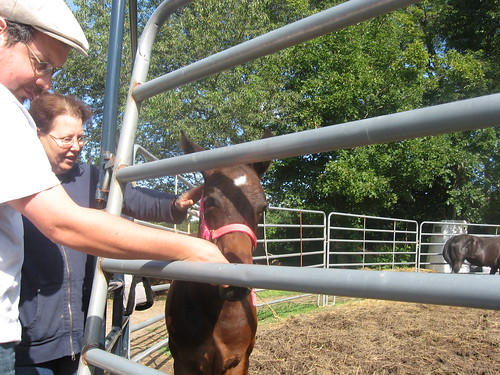|
Two readings that were rattling around my brain this past week as I practiced understanding Spanish:
| ¿Que lee? Novelas policiales en francés, un idioma que apenas entiende, lo que hace que las novelas sean aún más interesantes. Aun asà siempre descubre al asesino antes de la última página. | | What is B reading? Detective stories in French -- a language he scarcely understands, which makes the novels even more interesting. And even so, he always figures out who was the killer before he reaches the last page. |
This is from Bolaño's "Wandering in France and Belgium" -- I like the way he points out that not fully understanding the language can make the reading experience (even) more interesting. This ties in very nicely with B getting interested in Altmann's asemic writing later in the story.And a longer passage, from Borges' lecture on Dante published in Seven Nights -- Borges is talking ("now that we are among friends") about his own introduction to the Comedia:
| El azar (salvo que no hay azar, salvo que lo que llamamos azar es nuestra ignorancia de la compleja maquinaria de la causalidad) me hizo encontrar tres pequeños volúmenes... los tomos del Infierno, del Purgatorio y del ParaÃso, vertido al inglés por Carlyle, no por Thomas Carlyle, del que hablaré luego. Eran libros muy cómodos, editados por Dent. CabÃan en mi bolsillo. En una página estaba el texto italiano y en la otra el texto en inglés, vertido literalmente. Imaginé este modus operandi: leÃa primero un versÃculo, un terceto, en prosa inglesa; luego leÃa el mismo versÃculo, el mismo terceto, en italiano; iba siguiendo asà hasta llegar al fin del canto. ... He leÃdo muchas veces la Comedia. La verdad es que no sé italiano, no sé otro italiano que el que me enseñó Dante y que el que me enseñó, después, Ariosto cuando leà el Furioso. | |
Fate (except of course there is no Fate, of course what we call Fate is our failure to understand the complex machinery of causality) led me to three slim volumes... the books of Inferno, Purgatory and Paradise, rendered in English by Carlyle (not by Thomas Carlyle, of whom we will speak later). They were lovely little books, published by Dent. They fit in my pocket. On one page would be the Italian text and facing it, the text in English, rendered literally. Picture this modus operandi: first I would read a verse, a tercet, in English; then I would read the same verse, the same tercet, in Italian; and I went on this way until I reached the end of the canto. ... I have read the Comedia many times. But the truth is, I don't know Italian, I don't know any more Italian than what Dante has taught me, and what Ariosto taught me later, when I read the Furioso.
|
Cool! Borges learned to read Dante the same way I learned to read Borges!I'm interested in the point about not knowing "any more Italian than what Dante has taught me" -- I think that this method of learning to read a foreign language teaches a particular voice before it teaches the language in a more general sense. I am at this point extremely comfortable with Borges' voice, and pretty comfortable with Bolaño's; but opening up a book in Spanish by some other author, I may understand it (like Soldados de Salamina, which I picked up yesterday and have just been breezing through), or it may be like reading Greek (like Hernández' La paloma, el sótano y la torre, which I opened a few days ago and could not make head or tail of).
posted morning of August 14th, 2010: Respond
➳ More posts about Roberto Bolaño
|







